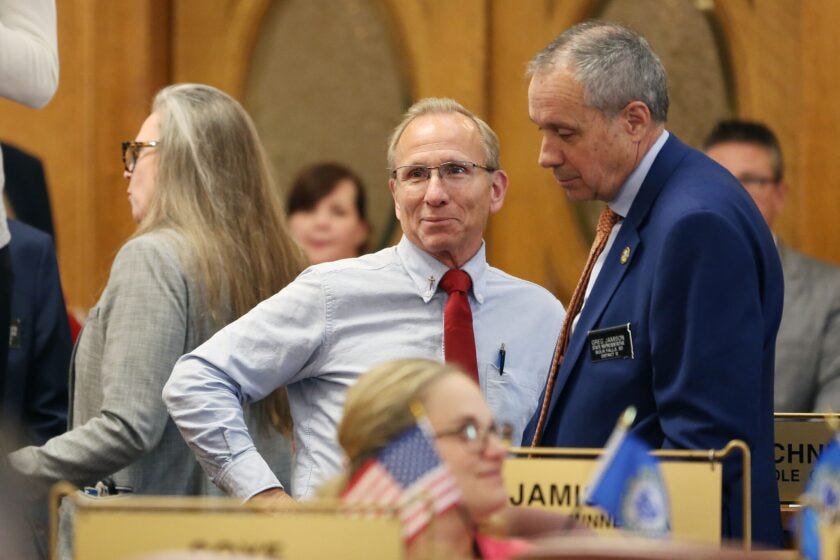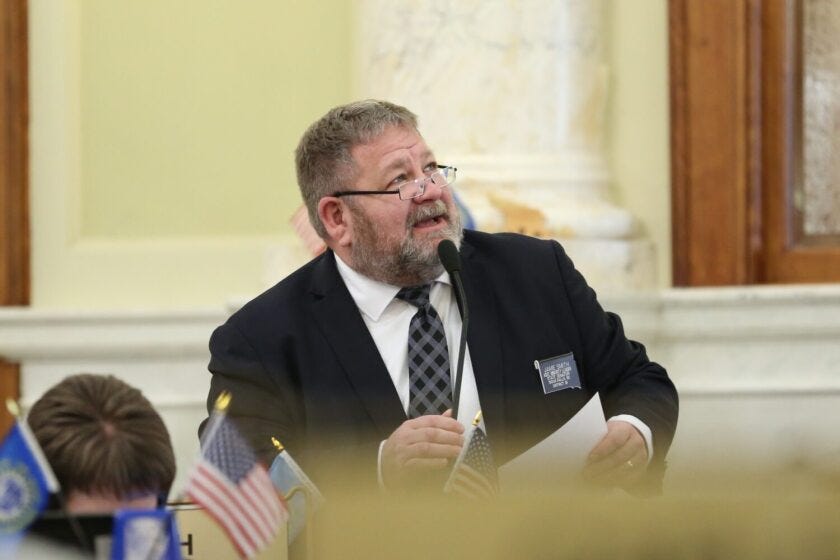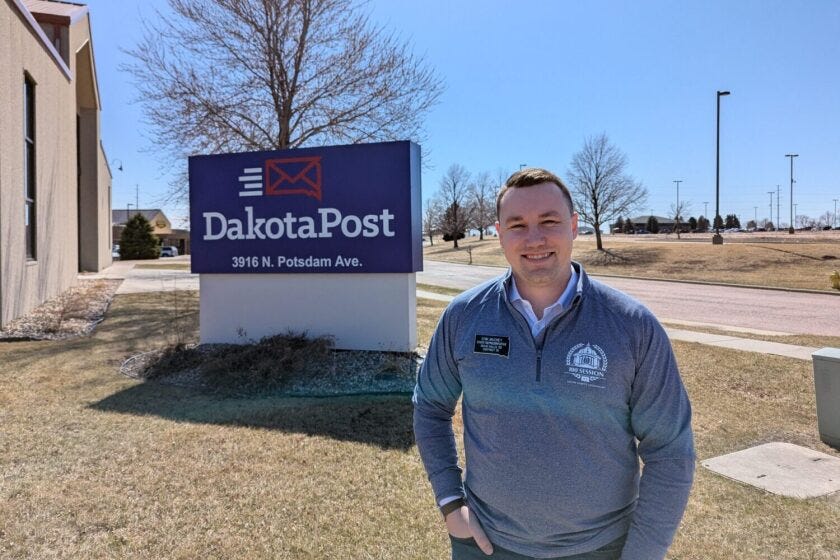Republican purge of RV voters could shift Sioux Falls district more Democratic
Mail forwarding company’s addition to precinct aided GOP in last election

A Republican-led effort to limit the voting influence of full-time travelers, such as RVers, could tilt a South Dakota legislative district more safely into Democratic hands.
If Republican Gov. Larry Rhoden signs House Bill 1066 into law, a person would need to have spent 30 consecutive days at some point in their life in a single physical location in South Dakota to be legally eligible to vote in the state.
If he also signs House Bill 1208 , however, it would open up one avenue for RV voters. Under that bill, people with a mailbox address in South Dakota — but no physical abode in the state or proof they’d ever had one for 30 consecutive days — could apply to register for a federal-only absentee ballot limited to candidates for president, U.S. senator and U.S. representative.
If Rhoden signs 1066 and not 1208, full-time travelers with South Dakota vehicle registrations and driver’s licenses wouldn’t be legally eligible for any kind of absentee ballot from the state without proof of a 30-day, single-location stay.
Legislative move to limit local voting rights of full-time travelers has some reconsidering their residency
The bills target full-time travelers, drawn for decades to establish residency in South Dakota by the state’s lack of an income tax and the relative ease of securing on-paper residency. In many cases, they register with mailbox forwarding businesses.
Those voters tend to be Republicans.
In one district in Sioux Falls, they nearly tipped a local legislative race away from a Democratic candidate.
Rep. Tony Kayser, the Sioux Falls Republican who sponsored the bills, wasn’t surprised to hear that.
He knew the party skew of the voters he’d targeted but he said he doesn’t care. Out-of-staters who vote in state or local races, he reasons, cancel out the votes of locals that might swing the other way.
“What’s right is right, what’s wrong is wrong, and that was wrong,” Kayser said.
Bills among a host of electoral reform proposals
Kayser’s bills were among a spate of “election integrity” reforms backed by GOP lawmakers who said they’re responding to constituent concerns about, among other issues, undue influence from out-of-state elements in South Dakota elections.
The GOP slant of the voters doing the alleged influencing wasn’t front-and-center during most debates on how to change their access to local ballots, but it came up at least once.
Sioux Falls Democratic Sen. Jamie Smith talked about it on the state Senate floor moments before he voted to pass HB 1208.

“A friend of mine over in the House won by nine votes, OK?” Smith said. “You take out the mailboxes, and he wins by hundreds of votes. Hundreds.”
He was referring to the spread in the race between his fellow District 15 Democratic lawmaker, Erik Muckey of Sioux Falls, and Republican Joni Tschetter. Muckey won after a recount.
Smith also claimed the race was competitive by design.
His and Muckey’s constituency grew by thousands of full-time travelers in the last round of legislative redistricting because, he implied, the state’s Republican lawmakers wanted to dilute the voting power of Sioux Falls Democrats.
“I’m not naive as to why they did that,” Smith said.
Redistricting is a process that follows each U.S. census, undertaken to more or less equalize district boundaries by population.
Republicans involved in the 2021 redistricting efforts that moved a mail forwarding company called Dakota Post into District 15 disputed claims of willful political scale-tipping in interviews with South Dakota Searchlight.
A Searchlight analysis of voting data from District 15, however, shows that Smith is correct about the impact of Dakota Post voters in 2024.
Presence of mailbox votes contributes to recount
District 15 voters were allowed to select up to two candidates in the 2024 state House race. The options were Democrats Muckey and Kadyn Wittman, and Republicans Joni Tschetter and Brad Lindwurm.
Both Democrats won in eight of the district’s 12 precincts, often with lopsided results. The Democrats won a combined 60% of the votes in the central Sioux Falls precinct that’s home to the Cathedral of St. Joseph, for example.

The opposite was true in three precincts, two of which were added in the 2021 redistricting. One other precinct delivered a split for Republicans – the precinct where Tschetter lives. She finished in the top two, but Lindwurm didn’t.
The largest GOP margins in the House race came in the precinct where the only physical address belongs to Dakota Post.
There are 4,742 voters registered there, according to voter roll data purchased by South Dakota Searchlight through the Minnehaha County Auditor’s office. Of those, 1,759 cast ballots in the 2024 general election, and most of them voted in the District 15 state House race.
The Republican candidates earned a combined 60% of the votes from Dakota Post.
SCOUTING REPORT | Midway hero’s new bridge, S.D. poet laureate honor, immigration surge, when coyotes attack
The old Lt. Cmdr. John C. Waldron Memorial Bridge that connects Pierre with its wilder cousin, Fort Pierre, came down with a boom March 16, dumping the old bridge girders into the Missouri River. It has been replaced by the new Waldron Memorial Bridge that has recently opened to motor vehicle traffic. Waldron was a hero of the World War II Battle of Midway. Though he perished in leading an attack on Japanese naval ships with his squadron of torpedo planes, his decision to attack is credited with helping the United States defeat Japan in what would turn out to be a pivotal battle against the Japanese.
“If you limit those mailbox voters, my election doesn’t have a recount,” Muckey said.
Yet he voted against both of the Kayser bills. The mailbox voters may have nearly swung the election against Muckey, but “at the end of the day, they’re my constituents,” he said, and he didn’t want to cast ballots to limit their rights.
Auditor drew precinct lines
The precinct boundaries in District 15 were determined by a Republican, Minnehaha County Auditor Leah Anderson. County auditors can’t redraw legislative districts, but they do have the authority to define voting precincts within those districts.
Anderson put every voter registered to Dakota Post into one precinct. Voters registered at central Sioux Falls’ Your Best Address, who were part of District 15 both prior to and after the 2021 redistricting, were also drawn into their own precinct. As a result, the 2024 primary and general elections were the first for which votes from those addresses could be sorted from others within District 15.
The move was inspired in part, Anderson said, by Pennington County, which long ago moved all the voters registered to a mail forwarding company called America’s Mailbox in Box Elder, near Rapid City, to their own precinct.
Anderson supported HB 1208 and HB 1066, and testified for them in Pierre. She was in the Senate gallery when Smith made the claim about Muckey’s race. She ran the recount that upheld the nine-vote margin.
She doesn’t buy the notion that the addition of mailbox voters helped Republicans in District 15. She sees changing demographics and an increase in independent voters as equally important factors.
But she doesn’t dispute that voters with mailboxes but no physical address lean Republican.
“Before I came into office, some of the legislators would tell me not to mess with this issue, because we get Republican votes out of those folks,” Anderson said. “We don’t need to do what benefits a certain party or benefits the state financially. It just needs to be what’s right.”
Democrats level gerrymandering accusation
Mailbox-only voters have been an issue for Democrats for years, according to the party’s executive director, Dan Ahlers. Voters drawn to South Dakota for low taxes have always skewed right, he argued, which is why most lawmakers didn’t worry much about them until “election integrity” came into vogue for pockets of the state’s political right.
“Now that Republicans are interested, now it’s an issue,” Ahlers said.
The claim that the state’s last redistricting work drew lines in the GOP’s favor in District 15 sounds correct to Democratic former lawmaker Troy Heinert, of Mission, who was among the lawmakers who worked on the 2021 redistricting.

“We knew that was going to become an issue in the Sioux Falls districts,” said Heinert.
He doesn’t like the term “mailbox voter,” at least not as a statewide term. Like many tribal-area residents, Heinert himself didn’t always register to vote using his physical address (he says his rural home didn’t even have one for years), opting instead for a post office box.
The problem, he said, is “nonresident voters” who don’t have a place to lay their head in the state but claim residency for tax reasons.
If the Republicans involved in redistricting claim they didn’t know they were adding thousands of those voters to District 15, Heinert said, “I don’t see how they couldn’t have.”
Which is not to say that all Democrats have been fully engaged with the issue, however. Democratic former Sen. Reynold Nesiba, of District 15, told South Dakota Searchlight that Dakota Post wasn’t top of mind until after his first post-redistricting election in 2022.
“I was shocked at how many thousands of people were registered at those places,” Nesiba said.
Republicans say gerrymandering claims overblown
Republican former lawmakers Mary Duvall and Jim Bolin, chair and vice chair of the state Senate Committee on Redistricting in 2021, denied that the mailbox moves were partisan.
Duvall, of Pierre, said specific addresses were not discussed by the committee.
“That is not a conversation that I engaged in at all,” said Duvall, who added that she was surprised to hear Smith’s claim on the Senate floor.
Bolin, of Canton, doesn’t accept any claims about gerrymandering. District 10, also in Sioux Falls, added more Democrats and improved that party’s chances. District 32’s redistricting added North Rapid, a heavily Native American area in Rapid City, which was a move Heinert pushed for to avoid diluting that community’s say. Democrat Nicole Uhre-Balk won a seat in District 32 in 2024.
“The current maps never could have passed without the support of the Democrats,” Bolin said.
Content courtesy of South Dakota Searchlight.




















Jim Bolin can deny gerrymandering until the cows come home. It doesn't change 40 years of finessed GOP gerrymandering. And to think the operatives that crunched the numbers for the committee, if not the members themselves, were not aware of the precinct placement of the mailbox voters is quite the joke. In 2010 Rep. Bolin insisted there was no gerrymandering because there were no counties split up (except for the mini-metros where the country club set in the suburbs win the "rural" district seats.) That argument doesn't fly for 2020, when several counties were split up to achieve party motives, so now it's "the Dems didn't make noise." excuse. I kind of doubt, with Troy Heinert in the room, that was the case. He did his work before the final vote.